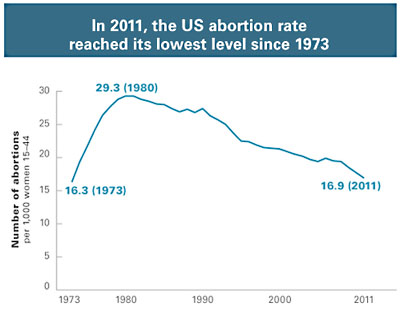You’ve probably heard that the abortion rate in 2011 dropped to its lowest level since 1973. You may have also heard that pro-lifers are adopting the inane talking point that this is due to the big raft of anti-abortion bills passed in red states after Republicans won their landslide victory in the 2010 midterms. There are two problems with this theory.
First, the drop in 2011 came before any of these new laws were passed. Second, as you can see in the chart below, the abortion rate has been falling steadily ever since 1980.
Better contraceptives are part of the reason for the declining abortion rate. Lower teen pregnancy rates are part of the reason. Changing sexual mores might be part of the reason. But laws restricting abortion? That might succeed in making lots of poor women miserable, but it has nothing to do with declining abortion rates. Not yet, anyway. More details here from Dana Liebelson and Molly Redden.



















